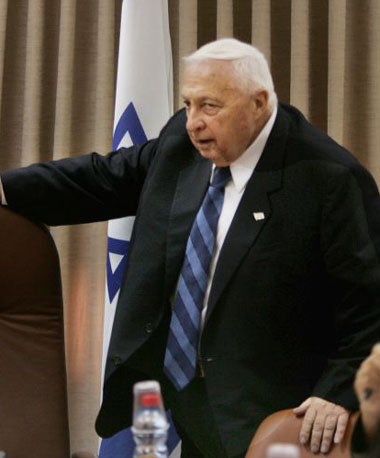'Political earthquake' shakes Israel as Sharon quits Likud

Your support helps us to tell the story
From reproductive rights to climate change to Big Tech, The Independent is on the ground when the story is developing. Whether it's investigating the financials of Elon Musk's pro-Trump PAC or producing our latest documentary, 'The A Word', which shines a light on the American women fighting for reproductive rights, we know how important it is to parse out the facts from the messaging.
At such a critical moment in US history, we need reporters on the ground. Your donation allows us to keep sending journalists to speak to both sides of the story.
The Independent is trusted by Americans across the entire political spectrum. And unlike many other quality news outlets, we choose not to lock Americans out of our reporting and analysis with paywalls. We believe quality journalism should be available to everyone, paid for by those who can afford it.
Your support makes all the difference.Ariel Sharon threw Israeli politics into turmoil last night by deciding to leave the Likud and run for re-election as prime minister at the head of a new centre party committed to a compromise peace on his terms with the Palestinians.
He told his closest allies this was the most difficult decision he had made in his 32-year political career. Mr Sharon himself welded the Likud from four right-wing parties in 1973. He is expected to go to President Moshe Katsav today and call for elections in the New Year.
One of his advisers said shortly after midnight local time: "He thought this was the right thing to do for the country. He believes that the Likud party can no longer fulfill its historical role in running the country with responsibility."
The decision came as no surprise, but Mr Sharon had kept the nation guessing. He let it be known that he was breaking away from Likud hours after Labour, under its new leader, Amir Peretz, voted to leave the ruling coalition.
In retrospect, the die was cast earlier this month when rebel Likud MPs vetoed his choice of two new ministers when they came up for statutory endorsement in the Knesset. The dissidents made it clear that they had not forgiven him for evacuating Jewish settlements from Gaza and the northern West Bank in August.
Mr Sharon calculated that even in the new parliament, they would make it impossible for him to govern at the head of the Likud. He is committed to implementing the international roadmap for peace, provided the Palestinians deliver their side of the bargain. He knows this will entail territorial concessions on the West Bank. One of his aides predicted that the rebels would not even let him evacuate illegal settlement outposts, as required.
Despite his 77 years, Mr Sharon is determined to fight on. He is convinced that he will form the next government, with or without the Likud. Weekend opinion polls suggested it would be a close call. A survey in the mass-circulation Yediot Aharonot showed him tying with Labour, with each winning 28 seats in the 120-member house, if he ran as the head of a new party.
Even if he comes out on top, his adviser acknowledged that he will have a hard job putting together a government.
At least 14 Likud ministers and MPs are expected to defect with Mr Sharon. There is also speculation some Labour opponents may join them. The Prime Minister made a pitch at yesterday's cabinet meeting for Shimon Peres, defeated by Mr Peretz for the Labour leadership two weeks ago, to come on board. "Shimon," he told Mr Peres, who at 82 is still reluctant to reach for his pipe and slippers, "this is only the beginning of our work together. I won't let you abandon the missions you are destined for. I will call on your assistance in the future." Mr Peres did not attend last night's Labour central committee meeting.
Mr Sharon's confidants heralded last night's decision as the start of " a political earthquake that will register nine on the Richter scale." Shimon Shiffer, a political commentator, forecast in Yediot Aharonot yesterday that it would start a reshuffling of the cards unprecedented in Israel's 57-year history. "The right," he wrote, "will rally around the ideal of Greater Israel; the centre under Sharon will rally around territorial compromise; and the left will be left to its own fate under Amir Peretz."
The Likud coalition
By Tom Pettifor
* The Likud Party was formed from four conservative parties Gahal, Free Centre, State Party and Eretz Yisrael in the run-up to the 1973 elections. Likud, Hebrew for unity, quickly became the country's conservative party.
* The uniting idea behind its formation was the belief that the territories occupied in the Six Day War of 1967 (Sinai, Gaza Strip, West Bank and Golan Heights) should be incorporated into Israel.
* The party operated as a coalition of its factions led by Menachem Begin, its first leader, until 1988 when they formally dissolved and Likud became a unitary political party.
* Mr Begin became Likud's first Prime Minister in 1977. Ariel Sharon, elected in March 2001, is the fourth, following Yitzhak Shamir (elected 1983) and Benjamin Netanyahu (elected 1996).
Join our commenting forum
Join thought-provoking conversations, follow other Independent readers and see their replies
Comments